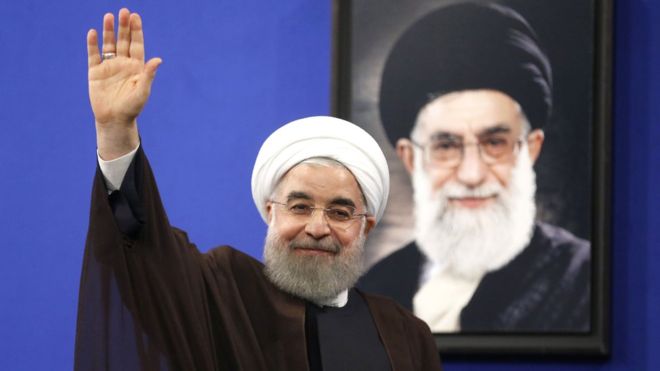Bolstered by a large margin of victory in his re-election, Iran’s President Hassan Rouhani immediately set out on his new challenge — taking on the Supreme Leader.
Rouhani won 57% of Friday’s vote, with hardline cleric Ebrahim Raisi gaining less than 40%, despite the backing of the Supreme Leader’s office and regime factions such as the Revolutionary Guards.
The wide gap defied expectations of a close outcome, after conservative Tehran Mayor Mohammad Baqer Qalibaf dropped out in favor of Raisi days before the vote. Rouhani appeared to benefit from a large turnout — almost 75%, according to the Interior Ministry — especially in supportive areas of the capital Tehran and other cities.
Further boosted by scenes of loudly enthusiastic crowds celebrating the result, Rouhani laid down the gauntlet to his opponents in his victory speech. He reasserted his policy linking economic recovery to “engagement” of other countries — an approach rejected by the Supreme Leader before and during the campaign — and gave signals of a renewed attempt to open up political and social space.
Rouhani paid tribute to his mentor, the late President Hashemi Rafsanjani, a figure disliked by many within the regime and barred from candidacy in 2013. He then went a step farther by mentioning “my dear brother Seyed Mohammad Khatami”, the President from 1997 to 2005 who has been blacklisted by regime authorities — he is barred from travelling abroad and he cannot be quoted or shown by the Iranian media.
The President also thanked Seyed Hassan Khomeini, the grandson of the Islamic Republic’s founder, Ayatollah Khomeini, who has been a prominent supporter of reformists since the mass protests after the 2009 disputed Presidential election.
During the campaign, packed Rouhani rallies loudly chanted the names of Mohammad Khatami and the opposition leaders Mir Hossein Mousavi and Mehdi Karroubi, Presidential candidates in 2009 who have been held under strict house arrests since February 2011. They roared when images of the three men were shown on the big screen.
Rouhani promised during the 2013 campaign that he would free Mousavi and Karroubi, as well as other political prisoners, but he has been contained by the Supreme Leader from pursuing that objective.
Maneuvering Over “Engagement”
Rouhani maneuvered carefully in his speech between promoting his foreign policy of engagement and avoiding an open showdown with Ayatollah Khamenei. The President began:
Today, Iran is prouder than any other time, ready to develop its relations with the world based on mutual respect and its national interests. The message of our people was expressed clearly in the election and today, the world knows well that the Iranian nation has chosen the path of interaction with the world, away from violence and extremism.
But, playing back Khamenei’s injunction to candidates to promise “not to rely on foreign powers”, the President continued:
Our nation wants to live in peace and friendship with the world but, in the meantime, does not want to accept any humiliation or threat. This is the most important message that our nation expects to be heard clearly by all governments, neighbours, and especially world powers. Our election announced to our neighbours and the region that the way of ensuring security in this region is strengthening democracy and respecting people’s votes, but not relying on foreign powers.
Rouhani also refrained from any repetition of his campaign challenge to the Islamic Revolutionary Guards Corps, where he criticized the elite organization for Iran’s ballistic missile testing and provocative slogan on the missiles and warned that his defeat would lead to the resurgence of “repression” in Iran.
The only reference to the Guards was in Rouhani’s conciliatory, “We are proud of our brave and courageous armed forces in the Army, IRGC, Basij, and the Police and consider their continued authority and power as the guarantor of peace and stability in the region, as well as peace and security of our people.”

